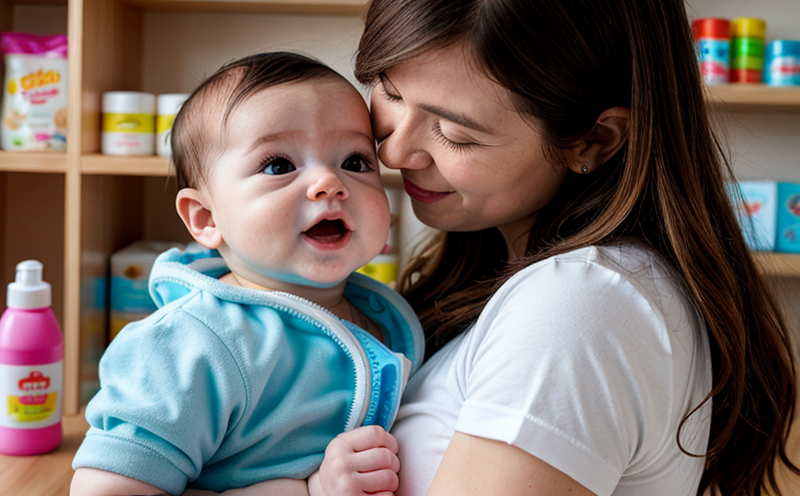Arsenic Content Testing in Baby Utensils
Testing arsenic content in baby utensils is a critical aspect of ensuring product safety and compliance with international standards. Arsenic, a toxic heavy metal, can pose significant health risks to infants due to their higher consumption rates relative to body weight compared to adults. This service ensures that the utensils meet stringent safety requirements set forth by relevant regulatory bodies.
Our testing process involves several key steps: sample preparation, analysis using advanced instrumentation like Inductively Coupled Plasma Mass Spectrometry (ICP-MS), and comprehensive reporting. The ICP-MS method allows for precise quantification of trace elements including arsenic at very low levels, which is essential given the stringent limits set by regulatory authorities.
The importance of this testing cannot be overstated. Babies are more susceptible to the adverse effects of arsenic because their digestive systems are less developed and they consume a higher volume per body weight compared to adults. Exposure can lead to developmental issues, behavioral problems, and even cancer in severe cases. Therefore, ensuring that baby utensils do not contain unsafe levels of arsenic is paramount.
Our team follows the latest guidelines from international standards such as ISO 8175-2:2019, which provides detailed procedures for testing heavy metals in toys and similar products. Compliance with these standards ensures that our clients can confidently market their products globally while adhering to stringent safety regulations.
In addition to compliance, this service offers valuable insights into the manufacturing processes used by suppliers. By identifying potential sources of contamination early on, manufacturers can take corrective actions to improve quality control and reduce risks associated with arsenic exposure.
- Compliance with International Standards: Adherence to ISO 8175-2:2019 ensures that products meet global safety requirements.
- Precision Measurement: Utilizing ICP-MS technology allows for accurate quantification of arsenic levels down to parts per billion (ppb).
- Early Detection: Identifying contaminants at the earliest stages helps prevent widespread issues and maintains consumer trust.
The ability to test for arsenic in baby utensils is just one example of how we contribute to creating safer environments for our youngest consumers. By providing this service, we help safeguard against potential health hazards and uphold high standards of product integrity.
Applied Standards
The testing of arsenic content in baby utensils adheres to several international standards designed to ensure the safety and quality of consumer products. One such standard is ISO 8175-2:2019, which specifically addresses the heavy metals present in toys and similar products intended for children under three years old. This standard provides detailed protocols on sample preparation, analytical methods, and acceptance criteria.
Another relevant standard is EN 71-3:2018, which extends ISO guidelines to cover a broader range of materials used in childcare articles. Both standards emphasize the importance of detecting trace amounts of harmful substances like arsenic to protect children's health.
ASTM F963-17 also plays a crucial role in this context by providing additional requirements for toy safety, including limits on certain toxic elements such as arsenic. These guidelines help manufacturers design products that are not only compliant but also safe for use by infants and toddlers.
The International Organization for Standardization (ISO) continues to update its standards based on new scientific findings regarding the risks posed by different chemicals. Keeping up-to-date with these updates ensures our testing remains aligned with current best practices in consumer product safety.
By incorporating these internationally recognized standards into our testing procedures, we ensure that every baby utensil undergoes rigorous evaluation before reaching market shelves. This commitment to excellence helps build confidence among parents and caregivers who rely on us for accurate assessments of their children's products.
Benefits
- Enhanced Safety: By identifying arsenic contamination early on, we help prevent health risks to infants.
- Compliance Assurance: Our testing ensures that products meet strict international standards for toy safety and quality.
- Informed Decision-Making: Detailed reports provide valuable insights into manufacturing processes and potential areas for improvement.
- Global Recognition: Adherence to ISO, EN, and ASTM standards enhances product reputation both domestically and internationally.
- Consumer Confidence: Knowing that rigorous testing is conducted builds trust among parents and caregivers who rely on us for accurate assessments of their children's products.
The benefits extend far beyond mere compliance; they encompass broader implications for public health and product integrity. Through careful analysis and reporting, we contribute significantly to maintaining high standards in the consumer products industry, particularly within sectors where safety is paramount.
Environmental and Sustainability Contributions
Incorporating arsenic testing into our services not only enhances immediate safety but also supports long-term environmental sustainability efforts. By detecting and addressing contamination issues promptly, we contribute to reducing waste generation associated with defective products that fail safety checks.
Our approach promotes a circular economy by encouraging responsible sourcing practices among manufacturers. This reduces the need for excessive resource extraction and disposal of non-compliant items, thereby minimizing environmental impact.
Furthermore, our commitment to accuracy and consistency in testing fosters transparency within supply chains. Suppliers can track their own performance more effectively knowing that they are working with a reliable partner who adheres strictly to stringent quality controls.
The integration of such services into broader sustainability initiatives underscores the importance of comprehensive oversight throughout production cycles. It highlights how individual actions at each stage, from raw material selection through final product release, play crucial roles in achieving sustainable outcomes across industries.





